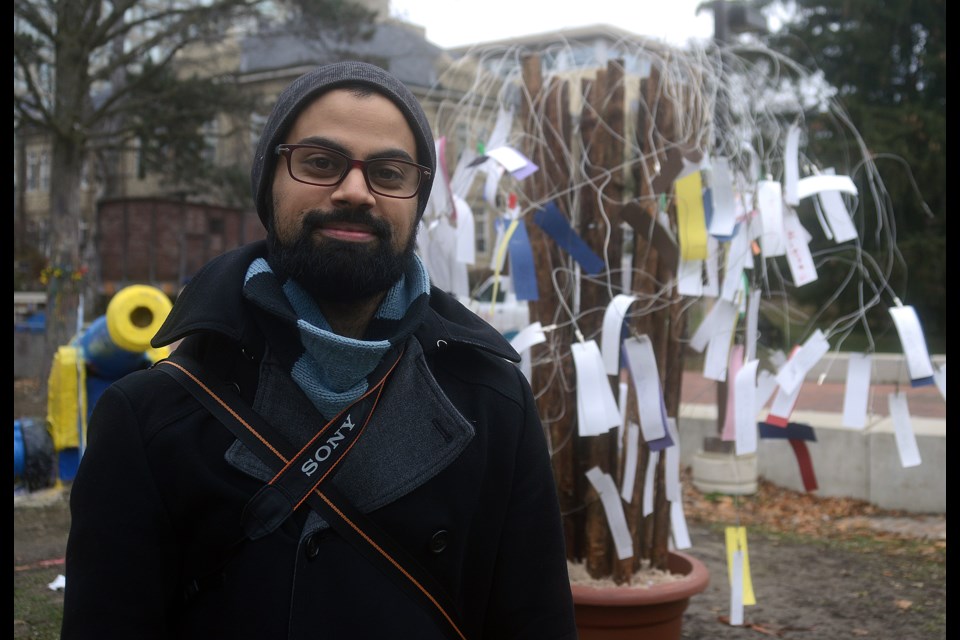The PoeTree came to the University of Guelph on Tuesday, offering people a chance to take, and leave, a piece of original poetry in the name of building community.
The brainchild of Toronto's Shawn Desouza-Coelho, The PoeTree is an artificial tree set in a large pot with wire dangling for branches adorned with alligator clips where people leave, and take, poems written by complete strangers.
It made a one-day stop at the U of G's Branion Plaza Tuesday.
The poems come in all lengths, styles, complexity and languages.
There are poems that start with “Roses are red, violets are blue….” And there are poems that talk about loneliness and despair. But they are all are free for the taking or people could use a lectern nearby to write their own and leave it on the tree for someone else.
“It’s been amazing to see the kind of exchange that people have done with one another,” said Desouza-Coehlo, who started The PoeTree last August and takes it to various locations in the Greater Toronto Area.
“It can be about inner turmoil and it can be about exterior superficiality if you want. It doesn’t matter. It’s all up to them,” he said.
Desouza-Coelho’s favourite poem, which is still on the tree, is 'My Son is a contradiction. Life is sweet.'
“I like that. I don’t know why, it just sounds nice,” he said.
The poetry is predicated on the motto of “community is the answer,” Desouza-Coelho said.
“I firmly believe that we’re going to eventually reach a point that we’re going to have to talk to our neighbours again and this is a perfect inroad to that.
“Once the tree is surrounded by people it’s great to see the way that they interact with one another and kind of inhabit that space with one another.”
The PoeTree started out as The Poetry Stand, “kind of a lemonade stand for writing,” said Desouza-Coelho.
He was doing his master’s degree in English at the University of Waterloo and to practice writing prose.
Inspired after reading Writing Down The Bones: Freeing the Writer Within by Natalie Goldberg, he set up a stand in a park, on the street and eventually on campus, where for a $1 donation to the food bank he would write strangers a poem or piece of prose.
“I would write it for them on the spot,” he said. “I wanted to practice the art of letting go of my writing.”
The response was overwhelming.
“The more I did it, the more I found that people were so receptive to it. It wasn’t so much a place of financial exchange, but an emotional exchange. I found that people were very open, honest and vulnerable about their lives.”
There were people that asked him to write about yogurt, but there were also people that told him of their life struggles and hurdles.
The PoeTree was the evolution of that concept and sentiment.
“So I wanted to create a space where people could come and do that with one another, absent me,” Desouza-Coelho said.
The ultimate goal is to have a PoeTree set up in a permanent space, maybe spaces.
He also wants to create an annual anthology of poems people leave, with sales from the anthology being funneled back into the community that The PoeTree stood.
